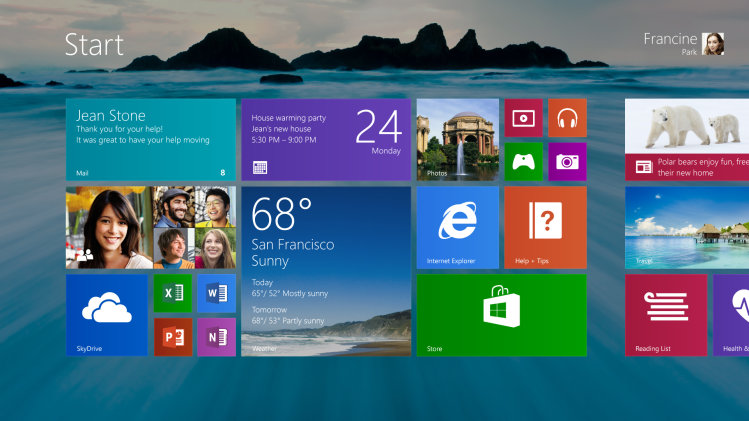
"Microsoft on Tuesday began sending a revamped version of Windows to makers of computers, smartphones or tablets powered by the software.
"We've hit an important milestone for Microsoft," Windows team executive Antoine Leblond said in a blog post.
"In many ways, this marks a new day for Microsoft, reflecting a number of rapid-release firsts."
Developers of applications tailored to run on Windows devices were irked, however, to find out that they will not get their hands on the finished version of Windows 8.1 until it hits the market in October.
In the past, developers had early access to new versions of Windows to allow time to make sure their applications work with the software.
"Seriously, has Microsoft fallen off its rocker?" a developer asked rhetorically in a chat forum below Leblond's blog post.
"This decision is yet another that leaves me questioning the judgment of Microsoft's current management."
Microsoft in June provided developers with a preview version of the "re-blended" Windows 8 operating system released late last year.
Windows 8.1 incorporated feedback from users and developers, and came with the promise that the US software giant was speeding up its release cycle to adapt to the dizzying pace of innovation in consumer technology.
"Windows 8.1 is a significant update," Leblond said.
"As we consider the code we just handed off, and the new intuitive and fluid computing experience it provides -- anytime, anywhere, across all devices -- we're confident we made the right bet."
Windows 8.1 remains true to the vision of an operating system tuned for touch-screen controls and multi-gadget lifestyles increasingly revolving around tablets and smartphones, according to Microsoft.
Microsoft is under pressure to adapt to a huge shift in how people engage with computers.
Smartphones and tablets have vanquished the days when people devoted the bulk of computer time to Windows-powered desktop or laptop machines.
The overhauled Windows 8 operating system released in November was designed to power the array Internet-linked devices.
Better adapting to the shifting Internet landscape is believed to be among the reasons behind the unexpected announcement last week that Microsoft chief executive Steve Ballmer will retire within 12 months.
"There is never a perfect time for this type of transition, but now is the right time," Ballmer said Friday in a written release.
"My original thoughts on timing would have had my retirement happen in the middle of our company's transformation to a devices and services company. We need a CEO who will be here longer term for this new direction."
Ballmer took over as CEO in 2000 from co-founder Bill Gates, a classmate and friend from their days at Harvard University in the 1970s.
While its Windows software is used on the vast majority of personal computers, Microsoft has had little impact in the fast-growing segments of tablets and smartphones. gc/jm"
"We've hit an important milestone for Microsoft," Windows team executive Antoine Leblond said in a blog post.
"In many ways, this marks a new day for Microsoft, reflecting a number of rapid-release firsts."
Developers of applications tailored to run on Windows devices were irked, however, to find out that they will not get their hands on the finished version of Windows 8.1 until it hits the market in October.
In the past, developers had early access to new versions of Windows to allow time to make sure their applications work with the software.
"Seriously, has Microsoft fallen off its rocker?" a developer asked rhetorically in a chat forum below Leblond's blog post.
"This decision is yet another that leaves me questioning the judgment of Microsoft's current management."
Microsoft in June provided developers with a preview version of the "re-blended" Windows 8 operating system released late last year.
Windows 8.1 incorporated feedback from users and developers, and came with the promise that the US software giant was speeding up its release cycle to adapt to the dizzying pace of innovation in consumer technology.
"Windows 8.1 is a significant update," Leblond said.
"As we consider the code we just handed off, and the new intuitive and fluid computing experience it provides -- anytime, anywhere, across all devices -- we're confident we made the right bet."
Windows 8.1 remains true to the vision of an operating system tuned for touch-screen controls and multi-gadget lifestyles increasingly revolving around tablets and smartphones, according to Microsoft.
Microsoft is under pressure to adapt to a huge shift in how people engage with computers.
Smartphones and tablets have vanquished the days when people devoted the bulk of computer time to Windows-powered desktop or laptop machines.
The overhauled Windows 8 operating system released in November was designed to power the array Internet-linked devices.
Better adapting to the shifting Internet landscape is believed to be among the reasons behind the unexpected announcement last week that Microsoft chief executive Steve Ballmer will retire within 12 months.
"There is never a perfect time for this type of transition, but now is the right time," Ballmer said Friday in a written release.
"My original thoughts on timing would have had my retirement happen in the middle of our company's transformation to a devices and services company. We need a CEO who will be here longer term for this new direction."
Ballmer took over as CEO in 2000 from co-founder Bill Gates, a classmate and friend from their days at Harvard University in the 1970s.
While its Windows software is used on the vast majority of personal computers, Microsoft has had little impact in the fast-growing segments of tablets and smartphones. gc/jm"
Tidak ada komentar:
Posting Komentar